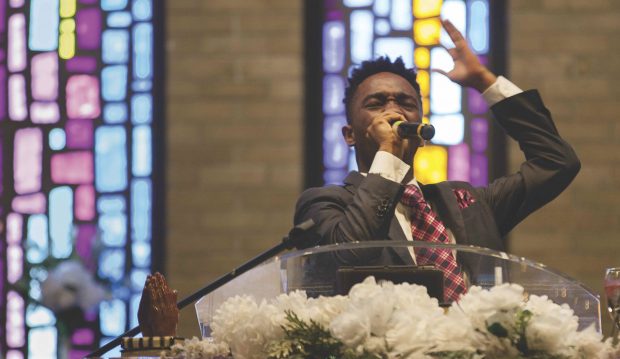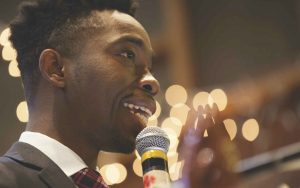
DONALD ABRAM ’16 grew up on the South Side of Chicago with a single mother and a grandmother who took him to church every Sunday, no excuses—and he tried using them all, down to not having clean socks.
Every week he would see church members joyfully worship. He never really understood what that was about even though he was an active member of the congregation. Then, on a cold December day when he was 14 years old, Abram says he heard a distinct call from God.
After coming home from school and warming himself by his space heater, Abram dozed off. In a dream, he saw himself walking down the center aisle at church, but as a celestial being, not a physical one. He looked up to the pulpit expecting to see his pastor standing there, but instead he saw himself preaching. Abram says he woke up shocked and shaken.
His father was a minister, and though Abram never lived with him, he knew the Sunday morning routine and what a preacher’s life entailed—and he wasn’t having any of it. Throughout his childhood, people had told him, “I see the call in your life,” but he says he ran from it.
Abram wanted to be a force for good—but in the form of an FBI agent, not a minister. Still, he talked to family, seeking advice and interpretation about the dream, which was now recurring. Ultimately, he had to come to grips with the vision on his own: He decided that God was in fact telling him to preach. So he went to his pastor, who decided to test him with a trial sermon. Abram preached his first sermon, and the pastor and elders confirmed that this call was a real one.
He vividly remembers one moment in the sermon when he thought: “This is what I saw in the dream. This is what I’m supposed to be doing, and I know that.”
You’ve heard of the preacher’s kid. But this was a preacher kid. All throughout high school, Abram delivered sermons at Greater New Mount Eagle Missionary Baptist Church, a black congregation. At first he mimicked his pastor, but soon he found his own rhythm and style, earning the nicknames “Fireball” and “Firecracker” for his blazing energy. Abram says he feels communion with both God and the audience when he’s in the pulpit.
“There are things that I will say and things that I will do that are not on my manuscript, and the Holy Spirit drops that down in my spirit and it comes out,” says Abram. “I am just so in tune with that moment that I know this is what I’m supposed to do—this is what I’ve been called to do.”
While growing up, Abram’s interactions were mostly with black people. His original plan was to attend the historically black Morehouse College, which Martin Luther King Jr. and Spike Lee attended—that’s where successful African American men went to school where he was from, Abram says. But when he received a Posse Foundation scholarship to Pomona, he began to rethink those plans. After researching the College, he decided to go west. Another big change was on the way.
THE DECISION TO come to Pomona was another turning point for Abram and the beginning of a four-year transformation. In the classroom, he was challenged to think of his faith more critically through courses like Professor Erin Runions’ Introduction to the Hebrew Bible. Runions’ goal is for students to approach the Scriptures as literature, from a scholarly perspective rather than a particular religious tradition. Looking at the Bible through this new lens created an inner struggle, he says.
 “It was incredibly difficult for me to take on a class that removed the sanctity of spirituality from the text.” says Abram. “Initially it felt really disrespectful to me. I didn’t feel like we were giving the due deference and respect.”
“It was incredibly difficult for me to take on a class that removed the sanctity of spirituality from the text.” says Abram. “Initially it felt really disrespectful to me. I didn’t feel like we were giving the due deference and respect.”
But the no-holds-barred questioning of the Bible gave him permission to reexamine his belief system. “There were a lot of questions that came up that I didn’t have the space to bring up on the South Side, with my pastor or my father,” Abram says.
The perspectives and points that Abram thought were great in the classroom ran counter to what he was taught in the church. He grappled hard with his faith, controversial texts and the ways he saw the Bible used to perpetuate injustice. In conversations, family members and his pastor noticed his worldview shifting.
As Abram’s advisor and teacher, Pomona College Politics Professor Lorn Foster witnessed that shift as well. Over time, Foster says, he saw an evolution in Abram and “a willingness to be more open about things than when he entered Pomona College. … His faith was more dogma when he entered the door.”
Abram would agree. Whereas before, he says, his spiritual practice revolved around a God that had a strict code of rules and regulations, at Pomona his perspective has widened and deepened into a recognition that the core of his belief is about relationship with Christ, not religion, he says. This ongoing faith journey is one of both reclamation and tension.
It is also a journey of relationships. On campus, he says, he encountered types of people he never had before—students from marginalized backgrounds that were markedly different from his black Chicago experience. He met undocumented students, gay students, students with mental illnesses—identities and stories that were new to him and that he felt the church he was raised in either ignored or was blind to. Over time, Abram became concerned not just about God but also about God’s politics, as he understood them. Another call began to stir in his heart.
Through his analysis of biblical texts, readings on black liberation theology, and his relationships with other students, Abram says he began to see Jesus not only as a spiritual savior but also as a revolutionary figure—an advocate for the poor and those on the fringes, who upended traditional religious institutions and whose central message was one of unconditional love. Religious leaders in that day were also government figures, and Jesus pushed back, Abram says. He points to the story of Jesus turning over tables in the temple in anger as a profoundly political act. “You could call it a protest. You could call it a sit-in. You can really call it an act of rebellion in many ways to a system that keeps [down] those in society who are viewed as less than or who are viewed as different or not as valued. And he is saying, ‘This system has to come down. This system has to stop. Because what you’re doing now on a very micro level is taking advantage of people.’”
NOW RELIGION AND POLITICS have become one and the same for Abram. Yes, his call was a personal transformation, but he was also called to transform institutions and systems of injustice, the politics major says.
Whenever he returns to his home church sanctuary, he preaches a message on how life in the pew and life in the public square are inextricably intertwined. In his sermons he is subtle, but intentional and strategic in weaving in his politicization, Abram says, and the response has been overwhelmingly positive as he offers critiques of materialism and urges congregants to fight for the most vulnerable in society. “I think the church is not able to see those connections because we focus on abortion, gay marriage or passing out Thanksgiving dinners,” says Abram. “We’re not focused on structural change.”
Abram points to inequities in the criminal justice system, massive wealth disparities and the behavior of Wall Street investors—and he believes the most effective ways to combat those inequities are through policy and government as well as a mobilized church. “Christ has called you to condemn that which is wrong,” and Abram believes the church writ large has missed some of what he sees now as obvious sins.
Along the way, Abram has become a fierce advocate for the Black Lives Matter movement, which he believes is “an indictment of the black church.” Of course, he says, the black church has held a key role in the civil rights struggles of the past. But on other issues the church has been silent at best.
“Black Lives Matter is actually doing what Jesus did. Not only are they saying, ‘We’re combating white supremacy.’ They are combating misogyny, transphobia, homophobia, discrimination against those who are differently abled,” says Abram. “I think Black Lives Matter has hit at the root of what it is Christ has called us to fight against but also the root of what the church has failed to address.”
Abram has held two internships in Washington, D.C.—one at the Center for American Progress and another with Joshua DuBois, formerly the head of the Obama administration’s Office of Faith-Based and Neighborhood Partnerships. He remains hopeful that change will happen both in the church and in public policy.
In the fall, he will attend Harvard Divinity School for a master’s of divinity degree. He may also pursue a master’s in public policy. Inspired by DuBois’s work, Abram wants to start a faith-based consulting firm, advising government, businesses and political campaigns. He says he may even run for public office someday.
“Jesus came as a liberator. Therefore in all that we do, we should do it in the name of liberation. And we should do that with conviction, with power and with strategy. … I want to be in a position where my faith is central to policies or advice that I give so that it can be impactful and beneficial for those that are most marginalized in our society.”
And preaching?
“I will continue to preach. I will always be a preacher.”
From Abram’s view, his call hasn’t changed—it has only grown.
—Photos by Drew Reynolds
